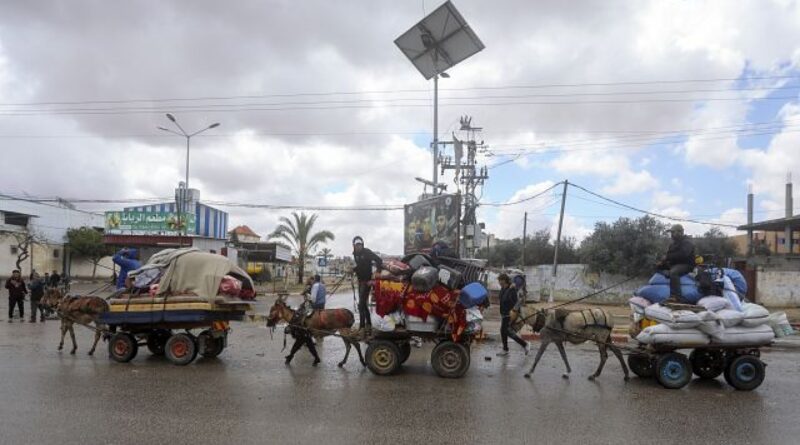Panic in Rafah as Israel drops warning of imminent offensive in leaflets across town
Tens of thousands of people, many displaced, have started packing up their belongings in the southern Gaza city of Rafah and fleeing
It comes as the Israeli military on Monday ordered the evacuation with a long-promised — and highly controversial — imminent ground invasion.
The announcement complicated last-ditch efforts by international mediators, including the director of the CIA, to broker a cease-fire.
Hamas and Qatar, a key mediator, have warned that an invasion of Rafah could derail the talks.
Israel has described Rafah as the last significant Hamas stronghold after seven months of war, and its leaders have repeatedly said they need to carry out a ground invasion to defeat the Islamic militant group.
But the news of the evacuation leaves displaced people like Sahar Abu Nahel in distress as she asks herself where to go next.
“Where are we going to go? We have no income. Maybe its more honorable for us to die. We are being humiliated,” she said in tears.
In Rafah, people received flyers Monday morning in Arabic detailing which neighborhood blocks needed to leave and where humanitarian zones had expanded to.
The flyers said that aid services would spread from Deir al Balah in the north to the center of Khan Younis city in the middle of the Gaza Strip.
Palestinians in Rafah said people gathered to discuss their options after receiving the flyers. Most said they did not want to move alone and preferred to travel in groups.
Israel’s army said on the social platform X it would act with “extreme force” against militants, and urged the population to evacuate immediately for their safety.
Israel’s plan to invade Rafah has raised global alarm because of the potential for harm to more than a million Palestinian civilians sheltering there.
“We are a people today who only have God (to help us). We have no shelter, no food, no water, none of that,” said Manhal Tartouri, who is now living in Rafah after he was displaced from Khan Younis.
“We were promised by the Israeli army and the international community that Rafah will be protected and that is why we came to Rafah, but regrettably they informed us of the evacuation or else, we will face something that no one wishes to face,” he added.
About 1.4 million Palestinians — more than half of Gaza’s population — are jammed into the town and its surroundings.
Most of them fled their homes elsewhere in the territory to escape Israel’s onslaught and now face another wrenching move, or the danger of facing the brunt of a new assault.
They live in densely packed tent camps, overflowing U.N. shelters or crowded apartments, and are dependent on international aid for food, with sanitation systems and medical facilities infrastructure crippled.
The U.N. agency that has helped millions of Palestinians in Gaza and the West Bank for decades, known as UNRWA warned on Monday of the devastating consequences of a Rafah offensive, including more civilian suffering and deaths.
The United States, Israel’s closest ally, has repeatedly urged Israel not to carry out the invasion, saying it does not have a credible plan to protect civilians.
But even as the U.S., Egypt, and Qatar have pushed for a cease-fire agreement, Israeli Prime Minister Benjamin Netanyahu repeated last week that the military would move on the town “with or without a deal” to achieve its goal of destroying the Hamas militant group.

